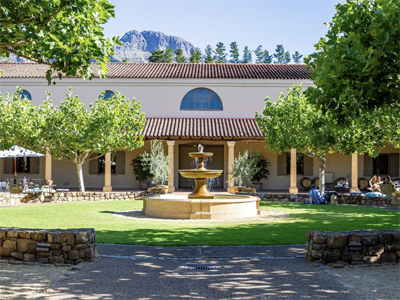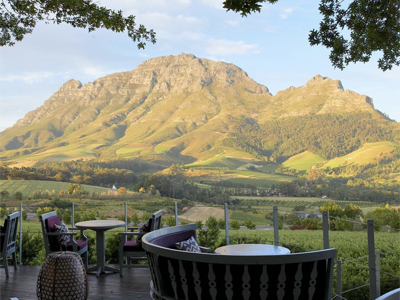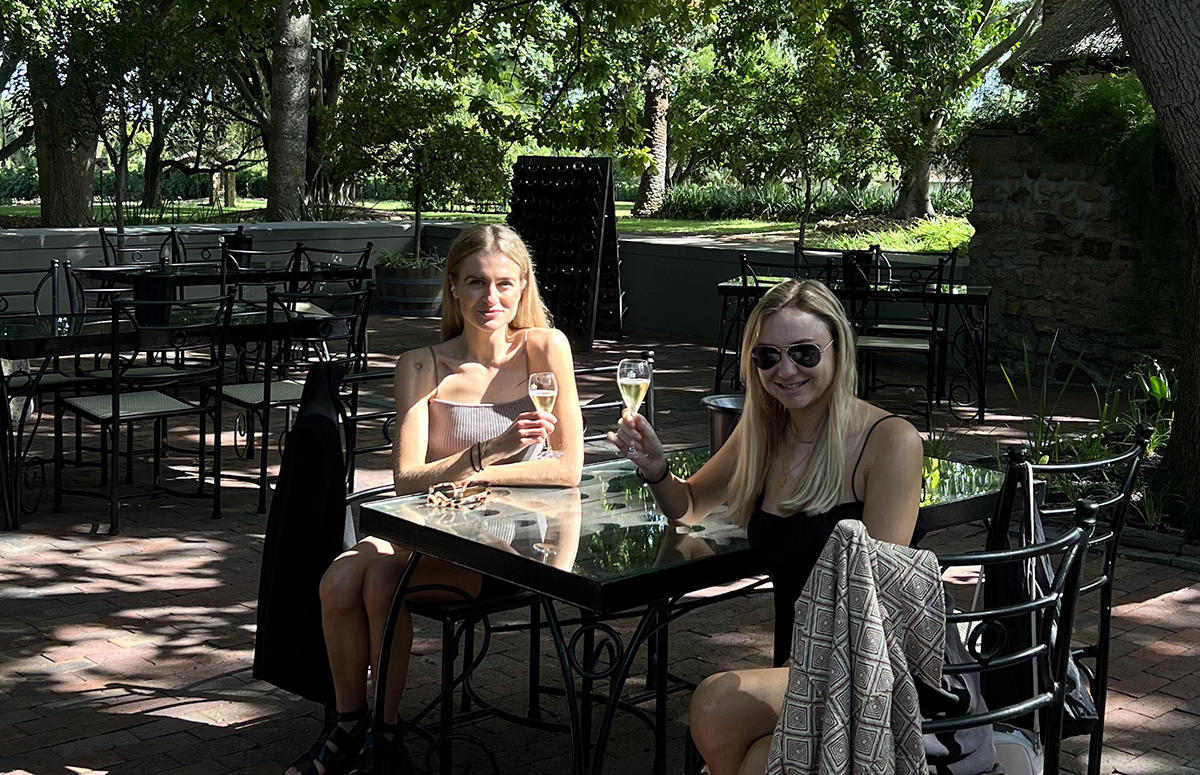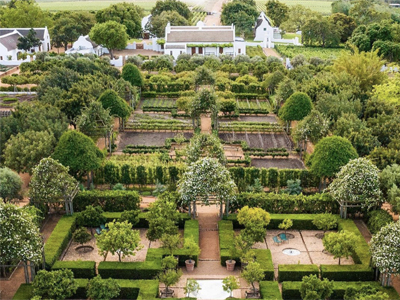You might already know me from my two previous "Cape Town blog posts": I'm Tabea - lifestyle editor, vegan brunch fan and always excited when I get to share my sustainable travel experiences.
In January 2023, I flew to Cape Town - with CO2 offsetting. Here I searched for the best
vegan restaurants and coolest
zero waste markets. I also toasted innovative ideas at sustainable wineries. Here I tell you which Wine Estates I was particularly taken with:
Sustainable Wine Estates around Cape Town
If you travel to Cape Town, sooner or later you will head to one of the wonderful wine estates outside the city centre. There are up to 200 wine and grape producers around the city.
55 of them are awarded "
Conservation Champions". This means that these wineries have made a commitment to WWF to increase biodiversity on their land, use regenerative farming methods and are continuously improving their water and energy efficiency. You can easily recognise them by a uniform logo and check out the current list
here.
In my two weeks in Cape Town, I visit five wineries that have a sustainable approach. I present my "Top Three" here:
Tip 1: Waterford Estate
The Waterford Estate in the Blaauwklippen Valley in Stellenbosch takes me to another world on the first day of my trip. When I enter the courtyard with its fountain surrounded by plane trees and hear the crickets chirping, I immediately feel relaxed. There is something very natural about the atmosphere. It seems as if the owners' aspiration - to work as well as possible with Mother Nature - is in the air.

The Waterford Estate is a WWF Conservation Champion. I find the emphasis placed on sustainability here particularly remarkable. More than half of the 120 hectares of land are not used for winegrowing - which would definitely bring in more money - but for the protection of natural vegetation. Sean, one of the guides with whom you can do the "Porcupine Trail Wine Walk", explains to us that they check the tree population on their property every year. "Foreign trees" are then removed and replaced with native ones.
The rosé I drink at the fountain has - like all the other wines of the estate - the "Integrity & Sustainability" seal. And it leaves a lasting, refreshing memory of a place I can really recommend to you.
More information about the Waterford Estate can be found
here.
Photo: @waterford_estate
Tip 2: Babylonstoren
One of the hottest destinations at the moment is Babylonstoren - one of the oldest Dutch farms in South Africa. It has its own farm, wine production, bakery, wonderful gardens and great restaurants.
I spend several hours on the lovingly landscaped grounds - but don't drink any wine. Even though there is a cellar tour, there is so much more to discover here. I'm particularly excited about the "Healing Garden", where all these unbelievable scents hit my nose. Rosemary, sage, thyme, cinnamon - everything smells so intense in the heated afternoon air. I read online that you can take part in
exciting workshops in the garden. For example, you can make your own essential oil to harvest lavender or watch the beekeeper at work.
Everywhere you go, you can feel how much tradition and a loving approach to nature are being upheld. For those who still need official proof: Babylonstoren is a member of the "Biodiversity & Wine Initiative". This means that everything is done on the estate to protect South Africa's botanical diversity - and in the most natural, resource-conserving way possible.
One last food tip from me: the spinach wrap at the Greenhouse. It is - like everything on the menu - "inspired by fresh, seasonal food straight from the garden".
Photo: @babylonstoren
Tip 3: Delaire Graff Estate
The "Delaire Graff" wine estate with a view over the Banghoek Valley is already more chic, but no less sustainable. I spend an entire afternoon at the estate in Stellenbosch, which is located about an hour away from Cape Town in the vineyards. Together with my friend Jana, I sit on the idyllic wooden terrace overlooking the valley and mountains. In large white chairs with red cushions. In the shade under trees swaying in the wind.
It is not only the decelerating atmosphere that immediately wins me over, but also the menu. What makes it special is that the kitchen not only stands for an excellent philosophy that interprets local food in a modern way; there is also a completely vegan menu with three starters, main courses and desserts each.
And of course, there's the wine, which not only tastes delicious, but comes from vineyards where 350 different plant species bloom magnificently. And for a particularly sustainable reason: the "Estate Wormery".

Yes, you read that right. Delaire Graff relies on the help of worms, which convert leftovers from the kitchen into organic, nutrient-rich compost and fertiliser. The result is a cycle that benefits everyone: the kitchen creates zero waste, the worms recycle and the vines naturally produce magnificent grapes, which in turn end up back in the kitchen - or in my glass.
By the way, my grilled butternut squash with orzo, tomatoes, carrots and vegan cheese - dressed with petals, transparent rice paper crisps and pretty blobs of creams, sauces and purees - is more than a dish. It's a poem.
Photo: @delairegraff
Sustainable wine estates in Cape Town - My conclusion
I can really only recommend visiting at least one sustainable wine estate near Cape Town and making a reservation beforehand - whether for a Wine Tasting, a Cellar Tour or a guided walk through the vineyards. Some estates also offer an e-bike tour of their grounds.
These excursions become particularly sustainable if you opt for the Franschhoek Wine Tram. This is a small hop-on hop-off train that travels along the wine estates. You can choose between ten different lines, each with eight stops.
My tip: take your time for each winery. When I landed in Cape Town, I put pressure on myself to visit as many as possible. But then I realised how much more beautiful it is when you get involved in the moment and consciously notice. I became a "slow traveller" - and was able to enjoy my impressions (and the good wine) much more.
Sustainable in Cape Town - did it work?
After two weeks in Cape Town, I'm flying home again. I have experienced, learned and tried out a lot. The city in South Africa inspired me - especially the people with a sustainable vision and the wine estates that value and support the country's nature so much.
I will miss the vegan food spots. I'm just too much of a fan of smoothie bowls, which are made from fresh, regional fruits and are on practically every breakfast menu. In general, Cape Town is as vegan-friendly as I've rarely experienced. In every restaurant, I came across my taste. In this blog post, I share my absolute favourites with you.
Only one thing dampened my euphoria a little: the amount of plastic in the supermarkets. Even fruit and vegetables that have a peel are shrink-wrapped in plastic here. To produce as little waste as possible, you should therefore go to a market like the Oranjezicht Market with your own jute bag. Here I was able to buy "my" papaya without plastic - and find other regional products.
Cape Town will remain sustainable in my memory.









